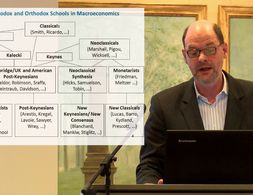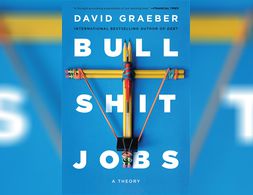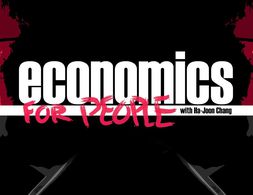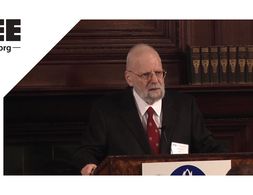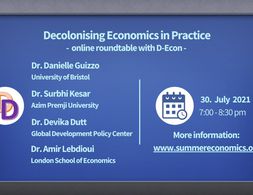✕
934 results
This unique up-to-date volume not only provides state-of-the-art discussions of the most recent developments in modern macroeconomics but also includes a series of interviews with leading economists that shed new light on the major intellectual and policy issues of the 1990s. The book is at once an invaluable text and a superb overview that will be welcomed by teachers and students alike.
An essay of the writing workshop on Nigeria’s Readiness for and the Effect of the Fourth Industrial Revolution
In this essay the author elaborates on the EU's perspective on the fast growing sector of the platform economy.
This lecture by Prof. Dr. Eckhard Hein is part of the Introductory Lectures on Heterodox Economics at the 20th FMM Conference in 2016. It gives a good overview about where Post-Keynesian Economics can be located and what it is all about.
Financial Evolution at the Speed of Thought A new evolutionary explanation of markets and investor behaviorHalf of all Americans have money in the stock market yet economists can t agree on whether investors and markets are rational and efficient as modern financial theory assumes or irrational and inefficient as behavioral …
In this volume, Katz offers a detailed summary of the foundations, evolutions and approaches of Dependency Theory in Latin America, focusing on the regional interpretations of Marxism, Developmentalism and World-Systems Theory.
Trade disputes are usually understood as conflicts between countries with competing national interests, but as Matthew C. Klein and Michael Pettis show in this book, they are often the unexpected result of domestic political choices to serve the interests of the rich at the expense of workers and ordinary retirees.
A Theory From bestselling writer David Graeber a master of opening up thought and stimulating debate Slate a powerful argument against the rise of meaningless unfulfilling jobs and their consequences Does your job make a meaningful contribution to the world In the spring of 2013 David Graeber asked this question …
This article reviews insights of existing literature on global care chains. A specific focus is laid on the impact that the refugee crisis has on global care chains and in turn how the crisis impacts the de-skilling of the women in the migrant workforce.
The last 15 years have seen extensive research into ecosystem service valuation (ESV), spurred by the Millenium Ecosystem Assessment in 2005 (Baveye, Baveye & Gowdy, 2016). Ecosystem services are defined as “the benefits people obtain from ecosystems” (Millenium Ecosystem Assessment, p.V). For example, ecosystems provide the service of sequestering carbon which helps regulate the climate. Valuation means giving ecosystems or their services a monetary price, for example researchers have estimated that the carbon sequestration services of the Mediterranean Sea is between 100 and 1500 million euros per year. The idea of ESV was a response to the overuse of natural resources and degradation of ecosystems, allegedly due to their undervaluation and exclusion from the monetary economy. ESV can be used (1) for policy decision-making, for example allocating funding to a reforestation project (2) for setting payments to people who increase ecosystem services, for example a farmer increasing the organic carbon content of their soil, and (3) for determining fees for people who degrade ecosystem services, for example a company that causes deforestation.
This essay deals with the concepts of Sustainable Land Management (SLM) and Land Degradation Neutrality (LDN).
Economics has become a monolithic science, variously described as formalistic and autistic with neoclassical orthodoxy reigning supreme. So argue Dimitris Milonakis and Ben Fine in this new major work of critical recollection.
In China's Gilded Age, Yuen Yuen Ang maintains that all corruption is harmful, but not all types of corruption hurt growth. Ang unbundles corruption into four varieties: petty theft, grand theft, speed money, and access money.
In this book, the author critically examines a number of socialist proposals that have been put forward since the end of the Cold War. It is shown that although these proposals have many merits, their inability effectively to incorporate the benefits of information technology into their models has limited their ability to solve the problem of socialist construction. The final section of the book proposes an entirely new model of socialist development, based on a "needs profile" that makes it possible to convert the needs of large numbers of people into data that can be used as a guide for resource allocation. This analysis makes it possible to rethink and carefully specify the conditions necessary for the abolition of capital and consequently the requirements for socialist revolution and, ultimately, communist society.
Happy International Women s Day This International Women s Day 2018 is an opportune moment to highlight prominent scholars of Feminist Economics As a subdiscipline of economics Feminist Economics analyzes the interrelationship between gender and the economy often critiquing inequities and injustices perpetuated by mainstream paradigms Work of this nature …
Getting to the policy discussion table is one of the objectives pursued by feminist scholars and advocates. However, some participants in this process have remarked that “you cannot get to the policy discussion table until you have proven that you can crunch the numbers.”
In this essay the authors argue for a wider concept of care work that includes community building, civic engagement and environmental activism. On the basis of the case of Cargonomia, a grassroot initiative in Budapest, they show that such a wider concept of care work could allow for different narratives that promote sustainable lifestyles with a milder environmental and social impact on the planet and its communities.
After completing the module, participants should be able to have general overview on the theory of commons. They can differentiate between neoclassical, new institutional and social/critical commons theory and can use these theories to assess real life common-pool resource management and commoning pratices.
Economics has long been the domain of the ivory tower, where specialized language and opaque theorems make it inaccessible to most people. That’s a problem.
Understanding international trade is central to economics and is currently a hot political issue. It’s an area where popular perceptions of mainstream economics are low, since they have historically missed some important downsides of trade agreements, especially the hollowing out of former manufacturing hubs in the Western world. et economists have for long time had a theory of trade with an impressive amount of scientific clout behind it: the gravity trade model.
The Austrian School of Economics is an intellectual tradition in economics and political economy dating back to Carl Menger in the late-19th century. Menger stressed the subjective nature of value in the individual decision calculus. Individual choices are indeed made on the margin, but the evaluations of rank ordering of ends sought in the act of choice are subjective to individual chooser.
The productive work of widely distributed academic research has contributed substantially, over the postwar period, to important advances in our understanding. It has also offered a clearer recognition of many unresolved problems. Never theless, the progress achieved over the last decades, ex hibited by the systematic application of "theory" to actual issues and observable problems, could not overcome a per vasive sense of dissatisfaction.
How can we establish new institutions and practices in order to use fare-free public transport as a beacon for sustainable mobility and a low-carbon lifestyle? The author of this essay elaborates on how practice theory and institutional economics can help to answer this question.
How do people make decisions? There is a class of models in psychology which seek to answer this question but have received scant attention in economics despite some clear empirical successes. In a previous post I discussed one of these, Decision by Sampling, and this post will look at another: the so-called Fast and Frugal heuristics pioneered by the German psychologist Gerd Gigerenzer. Here the individual seeks out sufficient information to make a reasonable decision. They are ‘fast’ because they do not require massive computational effort to make a decision so can be done in seconds, and they are ‘frugal’ because they use as little information as possible to make the decision effectively.
Marx’s theory of the falling rate of profit is not only empirically borne out, but the theory he proposed seems to describe accurately how that happens. Furthermore, the whole process is useful for understanding the history of contemporary capitalism.
In this lecture, Prof. Israel Kirzner presents a historical overview of the development of the Austrian school. The talk covers a timespan from the beginnings of the Austrian School in the early 1870's till just before the more recent 'revival' of the School in the mid-1970's.
This talk is an exploration of a feminist centred world, where women's labour, women's energy, women's contributions to the economy are not a side event but the main event.
The new online platform ‚DIY Macroeconomic Model Simulation‘ provides an open-source code repository and online script for macroeconomic model simulation. It follows a “do-it-yourself” (DIY) approach, empowering users to numerically simulate key macroeconomic models on their own using the programming language R.
This essay draws on several analyses on the gender impact of the recession and of austerity policies, in which authors acknowledge a threat to women’s labour market integration and a potential backlash to traditional gender labour structures. We contribute to that literature by asking whether recession and austerity convey a gender effect on educational attainment. Our aim in this essay is to portray the likely effects of austerity measures on gender equality with a focus on women’s participation in tertiary education and to hypothesize the implications of these scenarios for labour market effects, to be tested in future empirical research.
An essay of the writing workshop on contemporary issues in the field of Nigerian economics: Labour and all the dynamics, such as laws, mobility, gender participation, regulation etc., that are associated with it cements the need for this paper which seeks to objectively review, analyse, and if deemed necessary, give plausible recommendations.
This collection of videos offers a short introduction to ecological economics and its main differences with respect to environmental economics.
Recent events such as the Black Lives Matter protests the the murder of George Floyd in Minneapolis US and the toppling of the statue of Edward Colston in Bristol UK have exposed existing racism colonialism and sexism in our society and in Economics While calls to improve diversity in Economics …
We use cookies on our website. Click on Accept to help us to make Exploring Economics constantly better!




